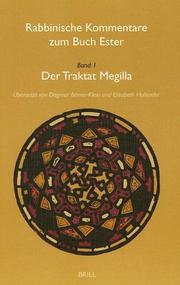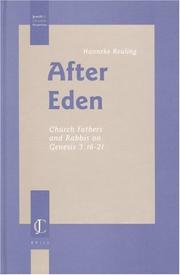| Listing 1 - 10 of 26 | << page >> |
Sort by
|

ISBN: 9789004497443 9789004119888 Year: 2000 Publisher: Leiden; Boston : BRILL
Abstract | Keywords | Export | Availability | Bookmark
 Loading...
Loading...Choose an application
- Reference Manager
- EndNote
- RefWorks (Direct export to RefWorks)
Vol. 1 of the "Rabbinical Commentaries on the Book of Ester" provides the German translations of the halakhic texts on Purim: The biblical book of Ester and tractate Megilla in Mishna, Tosefta and in Talmud Bavli.

ISBN: 9789004497450 9789004119895 Year: 2000 Publisher: Leiden; Boston : BRILL
Abstract | Keywords | Export | Availability | Bookmark
 Loading...
Loading...Choose an application
- Reference Manager
- EndNote
- RefWorks (Direct export to RefWorks)
Vol. 2 contains the Midrashim on Ester: Panim Acherim A and B, Midrash Megillat Ester, Pirqe deRabbi Elieser, chap. 49-50, Midrash Megilla, Leqah Tov and Jalqut Shimoni on Ester, Midrash Abba Gurion, Ester Rabba, Sefer Josippon, chap. 9 and Midrash Psalm 22. This source publication of commentaries in Talmud and Midrash on the Book of Ester provides German translations which make visible the flow of argumentation, the structure of the texts and parallel passages within rabbinical literatur. The texts show different approaches to declaring the book of Ester a holy book by means of interpretation.
exegesis --- Old Testament --- Rabbinic Literature
Book
ISBN: 3110437783 311036641X 9783110366419 9783110366426 3110366428 9783110437782 3110368374 9783110368376 Year: 2015 Publisher: Berlin Boston
Abstract | Keywords | Export | Availability | Bookmark
 Loading...
Loading...Choose an application
- Reference Manager
- EndNote
- RefWorks (Direct export to RefWorks)
Rabbinic hermeneutics in ancient Judaism reflects this multifaceted world of the text and of reality, seen as a world of reference worth commentary. As a mirror, it includes this world but perhaps also falsifies reality, adapting it to one's own aims and necessities. It consists of four parts: Part I, considered as introduction, is the description of the "Rabbinic Workshop" (Officina Rabbinica), the rabbinic world where the student plays a role and a reformation of a reformation always takes place, the world where the mirror was created and manufactured. Part II deals with the historical environment, the world of reference of rabbinic Judaism in Palestine and in the Hellenistic Diaspora (Reflecting Roman Religion); Part III focuses on magic and the sciences, as ancient (political and empirical) activities of influence in the double meaning of receiving and adopting something and of attempt to produce an effect on persons and objects (Performing the Craft of Sciences and Magic). Part IV addresses the rabbinic concern with texts (Reflecting on Languages and Texts) as the main area of "influence" of the rabbinic academy in a space between the texts of the past and the real world of the present.
Rabbinical literature --- History and criticism. --- Rabbinical literature - History and criticism --- Judaism. --- Rabbinic literature. --- Roman Religion. --- language theories. --- magic.
Book
ISBN: 3110699311 Year: 2020 Publisher: Berlin ; Boston : De Gruyter,
Abstract | Keywords | Export | Availability | Bookmark
 Loading...
Loading...Choose an application
- Reference Manager
- EndNote
- RefWorks (Direct export to RefWorks)
Bisherige Betrachtungen einer jüdischen Rezeptionsgeschichte Jonas beschränken sich auf die Deskription vermeintlich wichtigster oder bekanntester Rezeptionsquellen. AUS DEM LEBEN DES BUCHES JONA untersucht die frühjüdischen und rabbinischen Rezeptionen des biblischen Propheten Jona auf ihre überlieferungsdynamischen Aushandlungsprozesse und ermittelt, woraufhin und mit welcher traditionsdynamischen Konsequenz im Wandel soziokultureller Kontexte rezipiert wurde. Die Rezeptionsgeschichte wird dabei, in Abgrenzung zur Auslegungs- und Wirkungsgeschichte, als Arbeitsfeld und nicht als Gegenstand der Forschung verstanden. Einer eigens entwickelten Methodik folgend werden Rezeptionen Jonas diskursanalytisch kontextualisiert und entlang einheitlicher Analysekategorien vergleichend untersucht. Dabei fließen sowohl historisch-kritische Denkansätze des New Historicism, als auch eine hermeneutische Skepsis hinsichtlich der Re-Konstruktion von Geschichte sowie methodologische Grundlagen der Vergleichenden Literaturwissenschaft und Religionswissenschaft, insbesondere in Auseinandersetzung mit Intertextualitätstheorien, in die Arbeit ein. Das Ergebnis ist ein detailreicher Bildausschnitt eines innerjüdischen Rezeptionsdiskurses. Daniel Vorpahl examines the early Jewish and rabbinic receptions of the biblical prophet Jonah for their narrative-dynamic negotiation processes. Following a specially developed methodology, Jonas’ receptions are contextualized in terms of discourse analysis and analyzed in a comparative manner along uniform analysis categories. The result is a detailed image section of an intra-Jewish reception discourse.
Book
ISBN: 9798887193076 Year: 2023 Publisher: Boston, MA
Abstract | Keywords | Export | Availability | Bookmark
 Loading...
Loading...Choose an application
- Reference Manager
- EndNote
- RefWorks (Direct export to RefWorks)
Jewish Culture and Creativity honors the wide-ranging scholarship of Prof. Michael Fishbane with contributions of his students on subjects that cover the gamut of Jewish studies, from biblical and rabbinic literature to medieval and modern Jewish culture, and concluding with case studies of the creative application of Prof. Fishbane's thought and theology in contemporary Jewish life. The innovative scholarship represented in this volume offers critical new perspectives from antiquity to contemporary Judaism and will serve as a stimulus for new directions in and beyond the field of Jewish studies.

ISBN: 9004146385 9047417011 9789004146389 Year: 2006 Volume: 10 Publisher: Leiden Brill
Abstract | Keywords | Export | Availability | Bookmark
 Loading...
Loading...Choose an application
- Reference Manager
- EndNote
- RefWorks (Direct export to RefWorks)
This volume charts the interpretation of Genesis 3:16-21 in a number of patristic and classical rabbinic sources. It is a case study in the reception of a biblical fragment in two intrinsically related yet distinct interpretative communities: early Christianity and rabbinic Judaism. Following the lead of the biblical text, this study sheds new light on each traditions' view of the human condition, more specifically on the way Church Fathers and Rabbis approach the themes of procreation, labour, mortality and corporeality. The book carefully studies the reading of the biblical text as proposed by a number of representative and influential authors or documents, including Ambrose of Milan, Didymus the Blind, John Chrysostom and Augustine, as well as Genesis Rabbah and Avot de Rabbi Nathan. The introductions at the beginning of each chapter enable also the non-specialist to enter the distinct literary worlds of midrash and patristic Bible interpretation.
222.2 --- 276:22 --- 276:22 Patrologie en exegese --- Patrologie en exegese --- Genesis --- Bible. --- Criticism, interpretation, etc. --- Exegesis. --- Explanation --- Church Fathers. --- Rabbinic Literature.
Book
ISBN: 1644690209 9781644690208 9781644690192 1644690195 Year: 2019 Publisher: Brookline, MA
Abstract | Keywords | Export | Availability | Bookmark
 Loading...
Loading...Choose an application
- Reference Manager
- EndNote
- RefWorks (Direct export to RefWorks)
The present volume honors Rabbi Professor Nehemia Polen, a rare scholar whose religious teachings, spiritual writings, and academic scholarship come together into a sustained project of interpretive imagination and engagement. With intellectual integrity and remarkable religious insight, Polen's work expands the reach of Torah into an academic quest for ever-broadening depth and connectivity. The essays in this collection, written by students, colleagues, and friends, are a testament to his enduring impact on the scholarly community. The contributions explore a range of historical periods and themes, centering upon the fields dear to Polen's heart, but they are united by a common thread: each essay is grounded in deeply engaged textual scholarship casting a glance upon the sources that is at once critical and beneficent. As a whole, they seek to give readers a richer sense of the fabric of Jewish interpretation and theology, including the history of Jewish mysticism, the promise and perils of exegesis, and the contemporary relevance of premodern and early modern texts.
Jewish philosophy. --- Jews --- Philosophy, Jewish --- Philosophy, Israeli --- Philosophy --- Hebrew Bible. --- Jewish mysticism. --- Jewish theology. --- Jewish thought. --- history and hermeneutics. --- rabbinic literature.
Book
ISBN: 3161547039 9783161547034 9783161547027 3161547020 Year: 2016 Publisher: Tübingen, Germany
Abstract | Keywords | Export | Availability | Bookmark
 Loading...
Loading...Choose an application
- Reference Manager
- EndNote
- RefWorks (Direct export to RefWorks)
Genesis Rabbah, the earliest rabbinic commentary on the book of Genesis, was composed in Roman Palestine around the fifth century CE and continued to be studied throughout medieval and modern times. In this volume, an international team of scholars explores the literary formation and textual transmission of this work as well as the historical, cultural, religious, and political contexts in which it was composed. -- From back cover.
Rabbinical literature --- History and criticism --- Midrash rabbah. --- Criticism, interpretation, etc. --- Religion --- Antiquity --- rabbinic literature --- Jewish Studies --- Midrash --- Biblical Interpretation --- Antike Religionsgeschichte --- Religionswissenschaft --- Altes Testament --- Antike
Book
ISBN: 3161577035 Year: 2020 Publisher: Tübingen, Germany : Mohr Siebeck,
Abstract | Keywords | Export | Availability | Bookmark
 Loading...
Loading...Choose an application
- Reference Manager
- EndNote
- RefWorks (Direct export to RefWorks)
In diesem Buch beschreibt Loren R. Spielman die Beschäftigung der Juden mit Theater, Sport, Pferderennen, Gladiatoren- und Bestien-Schauen in der Antike. In seiner Arbeit nimmt er Bezug auf jüdische Schauspieler und Athleten, Organisatoren und Stücke der Antike und analysiert rabbinische und andere frühjüdische Kritiken von Sport und Spektakel.
Jews --- History --- Greece --- Rome --- Civilization --- Jewish influences --- Jewish influence. --- Social life and customs. --- rabbinic literature --- Josephus --- Roman Empire --- Roman spectacle --- Acient Palestine --- Religionswissenschaft --- Antike
Book
ISBN: 9781644691427 1644691426 9781644691410 1644691418 Year: 2019 Publisher: Boston, MA
Abstract | Keywords | Export | Availability | Bookmark
 Loading...
Loading...Choose an application
- Reference Manager
- EndNote
- RefWorks (Direct export to RefWorks)
This volume collects several articles by scholar Uri Zur on various areas in the field of Jewish studies. Topics discussed include different types of structure in Talmudic texts from a literary point of view, the study of the Aramaic language utilized in the Bible and the Talmud from a linguistic and interpretive perspective, the redaction of sugyot in the Talmud Bavli analyzed from a textual point of view, and matters of halakha and halakhic rules. The author also examines contemporary topics such as modern Judaism in Israel and peacemaking efforts grounded in the Pentateuch and Jewish tradition.
Aramaic. --- Biblical criticism. --- Biblical interpretation. --- Biblical translation. --- Gemara. --- Hebrew. --- Hillel. --- Israel. --- Jewish law. --- Jewish studies. --- Jewish tradition. --- Judaism. --- Modern Orthodox Judaism. --- Pentateuch. --- Talmud Bavli;Eruvin;criticism. --- Talmud. --- ancient texts. --- contemporary Judaism. --- form-stylistic design. --- halakha. --- interpretation. --- linguistics. --- peace. --- peacemaking. --- rabbinic literature. --- redaction. --- sugyot. --- tannaitic text. --- traditional Jews. --- tripartite structure. --- Talmud. --- Criticism, interpretation, etc. --- Aramaic. --- Biblical criticism. --- Biblical interpretation. --- Biblical translation. --- Eruvin. --- Gemara. --- Hebrew. --- Hillel. --- Israel. --- Jewish law. --- Jewish studies. --- Jewish tradition. --- Judaism. --- Modern Orthodox Judaism. --- Pentateuch. --- Talmud Bavli. --- Talmud. --- ancient texts. --- contemporary Judaism. --- criticism. --- form-stylistic design. --- halakha. --- interpretation. --- linguistics. --- peace. --- peacemaking. --- rabbinic literature. --- redaction. --- sugyot. --- tannaitic text. --- traditional Jews. --- tripartite structure.
| Listing 1 - 10 of 26 | << page >> |
Sort by
|

 Search
Search Feedback
Feedback About UniCat
About UniCat  Help
Help News
News